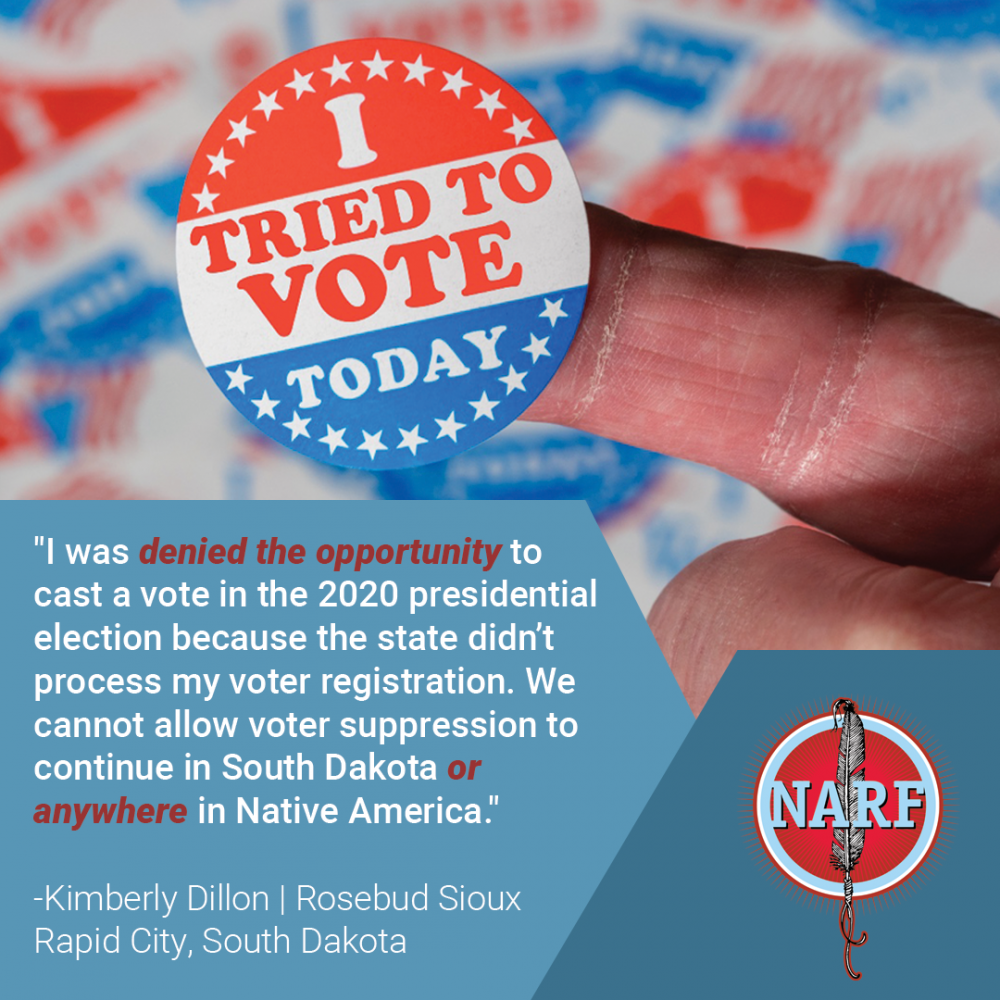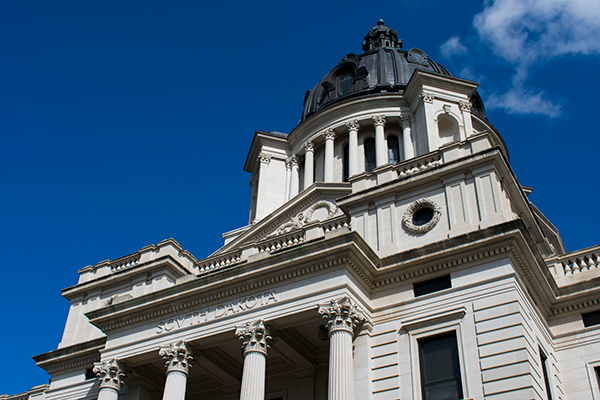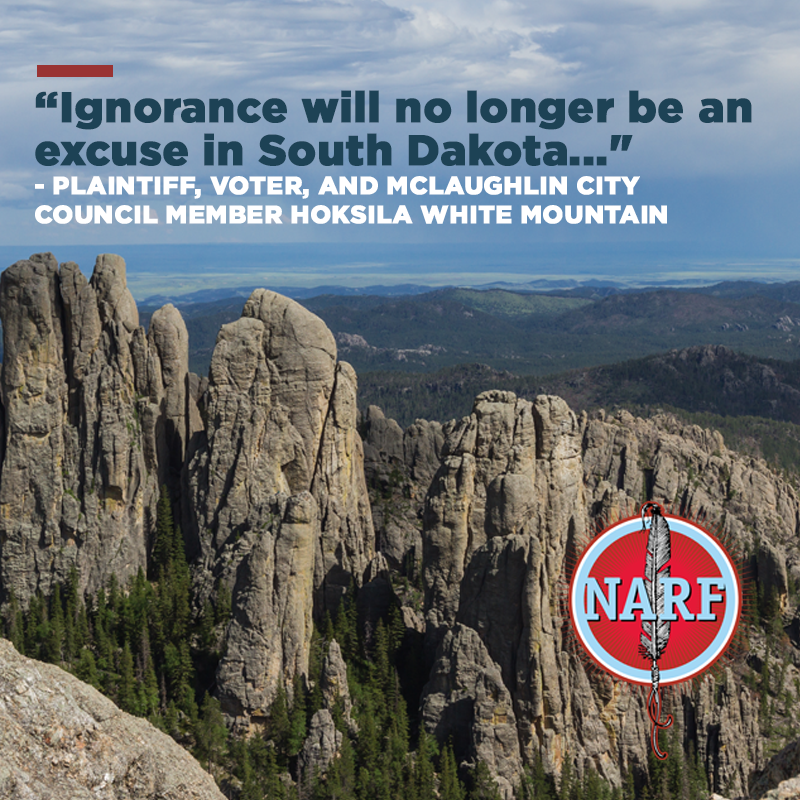In Rosebud Sioux Tribe v. Barnett, tribal governments, a Native civic organization, and individual voters successfully called out South Dakota for failing to comply with the federal legislation that requires states to provide all voters, including Native voters, opportunities to register. Agencies with Native populations in their service areas returned suspiciously low numbers of processed voter registrations and that had to stop. The case was settled in September 2022. We continue to monitor the state’s implementation of the settlement agreement.
Background:
For nearly 30 years, states have been required to provide voter registration to people applying for driver’s license and for people applying for services at public agencies. The Rosebud Sioux Tribe, the Oglala Sioux Tribe, the Lakota People’s Law Project, and individual voters filed a lawsuit in the United States District Court for the District of South Dakota, Western Division. The suit was brought against South Dakota for failing to offer voter registration services to the public as mandated by the National Voter Registration Act (NVRA).

The NVRA requires state public assistance agencies and motor vehicle offices to provide voter registration services when people apply for services, renew eligibility, or provide change-of-address information. Native Americans who completed voter registration forms at state agencies and driver license offices have found the state did not process their registrations or those individuals were never offered an opportunity to register to vote.
“I was denied the opportunity to cast a vote in the 2020 presidential election because the public agency didn’t update my address,” said plaintiff Kimberly Dillon (Rosebud Sioux Tribe).
The Native American Rights Fund (NARF) noted the chilling impact the lack of voter registration opportunities had on Native participation in U.S. elections. “Voter registration has been going down in South Dakota and it’s no accident—violating the NVRA is a major cause. This is what voter suppression looks like.” said former NARF Staff Attorney Natalie Landreth.
The Litigation:
May 2020: Notice Letter Sent
On May 20, 2020, the Rosebud Sioux Tribe, the Oglala Sioux Tribe, and Four Directions, a non-profit group that works to encourage civic participation in Indian Country, notified South Dakota officials of serious and ongoing violations of federal requirements for providing voter registration opportunities through public assistance agencies and departments of motor vehicles. The notice letter to the Secretary of State, as the state’s chief elections official, asked state officials to respond within 20 days to avoid the need for federal court litigation.
The notice letter documented a steep drop in voter registration applications from public assistance agencies in recent years and clear evidence of non-compliance with the NVRA. The violations described in the letter included:
- Failure to provide voter registration applications to persons during all public benefits transactions required by the NVRA
- Failure to update applicants’ voter registration address when they report a change of address to public benefits agencies
- Failure to provide voter registration services to persons who lack either a social security number or driver’s license
At the time, former NARF Staff Attorney Natalie Landreth explained, “When you go to a state office, such as to get your driver’s license or to apply for public assistance, you are supposed to be able to register to vote at the same time. The state is supposed to facilitate voter registration, but that is not what is happening in South Dakota. Reservation residents in particular are not being given this opportunity, and it is driving down voter participation.”
In this matter, the NARF represented the tribal governments and Demos represented Four Directions. As the public health restrictions during the Covid-19 pandemic reduced person-to-person activities like conventional voter registration drives, the issue of access to voter registration opportunities became even more critical. “Access to voter registration through government agencies is more important now than ever, given the difficulties of conducting traditional door-to-door registration drives,” said Demos Senior Advisor for Legal Strategies Brenda Wright. “Demos has worked in many states to improve agency-based voter registration, and we hope that South Dakota officials will also work with us to ensure that South Dakotans can participate fully in the upcoming elections.”
September 2020: Lawsuit Filed

On September 16, 2020, the Rosebud Sioux Tribe, the Oglala Sioux Tribe, and voting rights group Four Directions filed a federal court complaint against South Dakota officials for failing to offer voter registration services, as mandated by the NVRA of 1995. “We documented Native American residents routinely being underserved by the state of South Dakota when it came to voter registration. Native Americans are not being offered the voter registration opportunities they are entitled to under law. We told the state that there was a problem, but they did not fix it. Apparently they did not see the disenfranchisement of Native voters and the silencing of Native voices as an important issue. We do,” said NARF Staff Attorney Jacqueline De León.
The complaint documents a steep drop in voter registration applications from public assistance agencies in recent years, and other clear evidence of non-compliance with the NVRA. For example, in 2004, South Dakota provided voter registration services through public agencies for 7,000 citizens. By 2016, that number had dropped to just 1,100 registrations, in spite of increases in the number of people accessing state assistance.
July 2021: Complaint Amended
On July 8, 2021, NARF and Demos filed an amended complaint to include the Lakota People’s Law Project, and voters Hoksila White Mountain and Kimberly Dillon as plaintiffs. The civil rights law firm Wardenski P.C. began serving as outside counsel to Demos in the case, and Terry Pechota of the Pechota Law Office in Rapid City joined NARF and Demos on the legal team for the plaintiffs.
Dillion, a resident of Rapid City and a member of the Rosebud Sioux Tribe, completed a voter registration application at a social services department office in 2019, but was not allowed to vote in 2020 because she was not on the list of registered voters. Poll workers had to turn her away because her voter registration had not been processed.
“I was denied the opportunity to cast a vote in the 2020 presidential election because the state didn’t process my voter registration,” said Dillon. “How many other people faced this violation of our basic freedom to vote? We cannot allow voter suppression to continue in South Dakota or anywhere in Native America.”
In the 10 months since the original filing, South Dakota agencies took no action to correct the issue and refused to engage in discussions with the plaintiffs. “We have long had the sense that South Dakota lacks the desire and motivation to increase our access to the polls,” said Rosebud Sioux Tribe President Bordeaux. “If we successfully register to vote and the state processes our registration, our reservation and some of our communities still lack polling places. The state is aware that many of our people lack the transportation and means to travel to faraway polls, yet they do nothing. The state’s inactions to address registration and polling barriers minimize the impact our votes could have, and we cannot let them get away with it.”
Many of the places where the NVRA requires the state to provide voter registration services would give low-income people the chance to have a voice in democratic processes. “If you stop and ask yourself, how many people have had to seek some form of state assistance due to COVID-19 over the past year and a half, you begin to get a picture of how dire it is to hold the state accountable to upholding the National Voter Registration Act,” said NARF Staff Attorney Samantha Kelty.
Native voters have to overcome a great number of obstacles to complete their voter registration. “Legislation like the NVRA aims to remove some of those barriers and the state of South Dakota must comply. The state of South Dakota has no right to silence Native voters by taking away opportunities to register or failing to process their completed voter registrations,” said NARF Staff Attorney Jacqueline De León. “Add South Dakota’s failure to follow existing national laws to the growing list of reasons why Americans are demanding new federal legislation to protect voters from discrimination at the state and local level.”
May 2022: Court Finds South Dakota Systematically Failed to Provide Mandatory Voter Registration Services to Native Voters
On May 26, 2022, a federal judge in South Dakota ruled that the state had committed numerous violations of the National Voter Registration Act (NVRA), commonly known as the “Motor-Voter” law. The NVRA requires driver’s license offices and public assistance agencies to provide voter registration services to their clients. In his decision in Rosebud Sioux Tribe v. Barnett, U.S. District Judge Lawrence Piersol ruled that the state had not fully complied with the NVRA’s mandate “to establish procedures that will increase the number of eligible citizens who register to vote.”
The plaintiffs alleged that many South Dakota voters—and disproportionately the nine percent of the population who are Native—have faced impossible hurdles when attempting to register to vote through driver’s license offices (DMV) or state-run public assistance offices. In its Thursday order granting summary judgment to plaintiffs on most of their claims, the court agreed.
“A huge win for all of South Dakota, this decision is one victory amongst a long history of denying and suppressing Natives’ right to vote in South Dakota and beyond. This is a first step in eliminating years of South Dakota’s willful neglect in complying with the NVRA. We hope that this increases the number of eligible citizens who are able to register to vote in South Dakota. It is crucial that we continue to fight to eliminate all obstacles to the Native vote,” said NARF Staff Attorney Samantha Kelty.
Order Summary:
The court ruled that the South Dakota Department of Public Safety (DPS), the State’s driver’s licensing agency, violated Section 5 of the NVRA by:
- Failing to automatically update the voter registration addresses of voters who update their DMV registration address;
- Refusing to provide voter registration services to individuals who lack an existing driver’s license number or Social Security number;
- Failing to forward completed voter registration applications to county election officials in a timely way;
- Failing to properly train DPS employees, maintain agency-wide procedures, or conduct internal oversight of local DPS offices sufficient to ensure NVRA compliance; and
- Failing to ensure that driver’s license “issue sites” operated by other agencies under contract with DPS, which are common in Indian County and other rural areas in South Dakota, provide voter registration services.
- The court also held that the South Dakota Department of Social Services, which administers TANF, SNAP, Medicaid, and other public assistance programs, violated its obligations under the NVRA by:
- Failing to provide voter registration services to clients during certain transactions, including changes of address conducted by telephone, administrative renewals of Medicaid benefits, and six-month eligibility reports for TANF and SNAP recipients;
- Failing to submit voter registration applications completed at DSS to county election officials in a timely way; and
- Failing to adequately train DSS staff or monitor the agency’s compliance with its NVRA obligations.
Finally, the court held that Secretary of State Barnett, who as South Dakota’s chief election official is charged by the NVRA to coordinate the state’s compliance with the statute, “contributed to these failings” through inadequate oversight and training of the other agencies.
“The court found that the state’s forms, services, and training were all inadequate to provide the minimum voter registration services required by law. In effect, by not offering these basic services, South Dakota has disenfranchised Native communities. This pattern not only breaks the law, but it goes against our American democratic ideals,” said NARF Staff Attorney Jacqueline De León.
September 2022: Motor-Voter Settlement Brings Far-reaching Reforms for South Dakota Voters
The week of September 6, 2022, voters across South Dakota learned they will benefit from the Rosebud Sioux Tribe v. Barnett settlement agreement to resolve the lawsuit challenging South Dakota’s numerous violations of the NVRA. “The settlement we negotiated details changes that South Dakota must make to provide the voter registration services guaranteed to each and every voter by federal law,” said Rosebud Sioux Tribe President Scott Herman.
The Rosebud Sioux Tribe, Oglala Sioux Tribe, Lakota People’s Law Project, and voters Kimberly Dillon and Hoksila White Mountain brought the lawsuit after a 2020 investigation uncovered rampant state-wide noncompliance with the NVRA. Agencies serving predominantly Native American communities reported particularly low numbers of voter registrations completed at their offices.
“This agreement requires South Dakota establish training and accountability mechanisms so voters, including Native voters, actually receive the legally-required opportunities to register to vote,” said Oglala Sioux Tribe President Kevin Killer.

The agreement, negotiated on the plaintiff’s behalf by the Native American Rights Fund (NARF), Demos, Wardenski P.C., and Terry Pechota of the Pechota Law Office in Rapid City, requires the Secretary of State to designate a statewide NVRA coordinator who will ensure statewide compliance by the agencies through mandatory training and monitoring.
“The agreement requires the state to monitor what happens at state agencies, and I hope this will reduce the numerous lost registrations and declining number of voter registrations at state agencies,” said plaintiff, voter, and Rosebud Sioux tribal member Kimberly Dillon, who could not vote in the 2021 Presidential Election because the voter registration form she submitted to a state employee fell through the cracks.
“Ignorance will no longer be an excuse in South Dakota as the agreement specifies the state must create guidance, ensure accurate training materials, and actually train state agency staff on Motor-Voter responsibilities,” said plaintiff, voter, and McLaughlin city council member Hoksila White Mountain, who witnessed Native people disproportionately turned away on election day in 2020 because local offices had not properly registered them to vote.
“This settlement brings victory to Native people seeking to register to vote in South Dakota, and to all voters who support fair U.S. elections this year and in the future,” said voter and Lakota Peoples’ Law Project Co-Director Chase Iron Eyes.
NARF Staff Attorney Samantha Kelty agreed: “South Dakota has a long history of denying and suppressing Natives’ right to vote. With this agreement, the state promises to end some of the practices that allowed disenfranchisement of Native voters.”
Demos Senior Advisor for Legal Strategies Brenda Wright called the settlement “long overdue.” “In other states, the Motor Voter law has been instrumental in getting eligible people registered for over 25 years. We welcome South Dakota’s decision to accept Judge Piersol’s ruling and implement these important reforms. Ensuring that all eligible South Dakotans, particularly Native Americans who have been systemically disenfranchised by the state, have the right to vote puts us a step closer to realizing a more just, inclusive, democracy.”
“It should not have taken a lawsuit to ensure South Dakota’s full compliance with the NVRA, a nearly 30-year-old law that has expanded voter registration opportunities in states across the country,” said Joseph Wardenski, founder and principal attorney at the Brooklyn, N.Y.-based civil rights law firm Wardenski P.C. “The comprehensive agreement we reached with South Dakota is a roadmap that every state should follow in complying with this law.”
“This settlement requires South Dakota to provide voter registration service to all communities equally and without bias,” said NARF Staff Attorney Jacqueline De León.
How Can I Help?
Your support allows our nonprofit legal organization to assist in defending the rights of Native peoples in cases like this. “In this case the Native American Rights Fund held state officials accountable to voters, including tribal citizens. Thank you to everyone who’s donations supported this work and thank you to the Rosebud Sioux Tribe, the Oglala Sioux Tribe, Lakota People’s Law Project, Four Directions, Kimberly Dillon and Hoksila Nation for making this stand for Native voters’ rights,” said NARF Executive Director John Echohawk.
The work to protect Native people’s right to vote continues. Please donate today to fuel more positive changes like this settlement. To learn more about our work, please subscribe to receive NARF publications and amplify NARF on social media.



